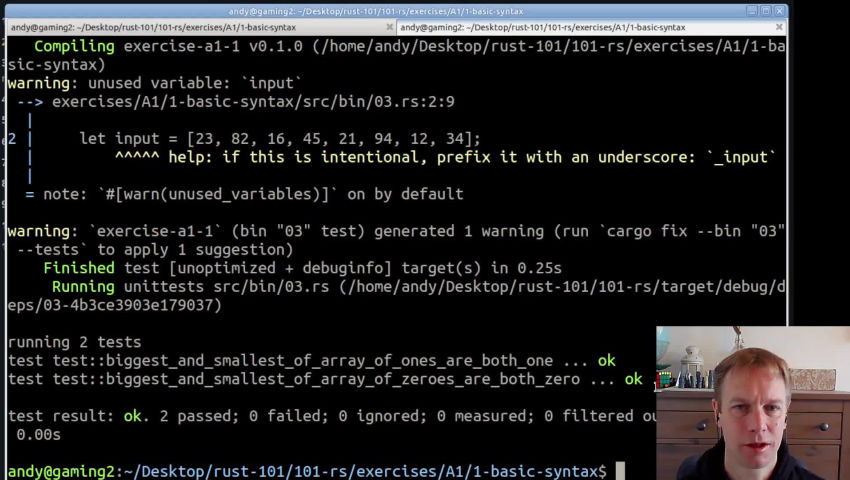- cross-posted to:
- [email protected]
- cross-posted to:
- [email protected]
cross-posted from: https://diode.zone/videos/watch/9766d1f1-6018-48ec-ad67-e971758f8a3a
Going through some exercises on basic Rust syntax and ownership.
Links:
Exercises: https://101-rs.tweede.golf/A1-language-basics/mod.html
Slides: http://artificialworlds.net/presentations/rust-101/A1-intro-to-rust
Rust 101 is a series of videos explaining how to write programs in Rust. The course materials for this series are developed by tweede golf. You can find more information at https://github.com/tweedegolf/101-rs and you can sponsor the work at https://github.com/sponsors/tweedegolf . They are released under the Creative Commons Attribution Share Alike 4.0 International license.
This series of videos is copyright 2023 Andy Balaam and the tweede golf contributors and is released under the Creative Commons Attribution Share Alike 4.0 International license.
These videos are roughly on track with the Reading Club apparently, so this video belongs here this week, I think.



In the last exercise (
05), I ran quickly tried to extend it into creating “unfloored halves” (you’ll know what I mean if you look at the exercise) … and ran into the process of initialising empty arrays.What I hit upon is:
let mut floating_data: [f32; 5] = [0.0; 5];Where the
0.0in[0.0; 5]is necessary it seems?? And you can’t simply havelet floating_data = [f32; 5];… ?From what I gathered, the general syntax is
[EXPR; SIZE], whereEXPRis actually evaluated, presumably to define the required memory/type, even though the type of the array (in the code above,f32) also constrains the type of elements of the array.In the code above, as the default float type is
f64, the typing of the array as[f32; 5]actually constrained or affected the way that the expression of0.0in the array literal was used to build the array.So why do I need to provide both so that they interact in this weird and implicit way?? Unless I’m missing something, surely something like
let floating_data = [f32; 5];would be better? Putting that0.0because it just needs to be there is tolerable but a bit off IMO.f32is a type, you need to actually provide a value to the shorthand array initialization syntax, the array is filled with that value. There is no such thing as “uninitialized” or implicit zeroing here.let foo: [f32; 5] = [0.0; 5];You seem to have indicated dismay over the default f64 type.
To type a integer or float literal, suffix it with its built-in type. For example:
0.0f321024usizeDoes this look ugly? Yes. Good news! It’s hardly relevant in an actual project because Rust will easily default to whichever float type you are using throughout the project as your floating point numbers with resolved types will resolve the types of the implicitly typed floating point numbers.
You can also use the same syntax with the
vec![]macro :)let bar = vec![0.0f32; 5];Shouldn’t we be able to do something like
let bar : [f32; 5] = [Default::default(); 5];?
I’m on mobile and too lazy to try whipping up a rust playground example to test this out myself.
I’ll do you one better!
let foo: [u8; 10] = Default::default();(pretty sure the above only works reliably after they finally were able to derive traits on n-sized arrays but that’s been in for a while now)
And as you suggested:
let foo: [u8; 10] = [Default::default(); 10];Thanks!
I recognise I was getting nitpicky there, just figured it might help someone else avoid confusion around it.
And yea, I figured I’d make sure I knew how to set the numeric type of my choice rather than just rely on inference.
Otherwise, I think I hate the postfix typing, I just can’t bring myself to use it lol.
But thanks for the help!!